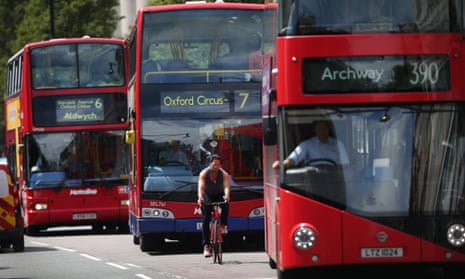London’s fast-expanding green bus fleet is to receive a further boost, after Transport for London (TfL) announced on Wednesday the launch of a new trial to test four specially designed hybrid buses capable of wirelessly charging their batteries at bus stops.
The Alexander Dennis Enviro400H E400 buses feature a diesel-electric hybrid engine and have been fitted with technology that will enable to batteries to receive a charging boost when stationary at specially equipped bus stops.
Four buses will operate from next year on the Stagecoach-operated route 69 between Canning Town and Walthamstow bus stations, both of which will be fitted with inductive wireless charging technology.
TfL didn’t disclose the projected carbon emission, air pollution, and fuel cost savings expected from the trial, but said the technology will allow the buses to operate in pure electric mode for “a significant period of the time they are in passenger service”.
“The buses have a diesel engine that will be used when the battery power on the bus is depleted, but it is anticipated this will only be a small amount of the time, meaning emissions on these vehicles are greatly reduced,” TfL said.
The trial is being part-funded by the Zero Emissions Urban Bus System (Zeeus) and represents the latest green bus pilot scheme to be undertaken by TfL, following the launch of a fleet of six pure electric buses, the introduction of zero-emission hydrogen buses on Route RV1 between Covent Garden and Tower Gateway, and the rollout of about 800 hybrid buses.
“We are continuing our assessment of new technology in the capital that can deliver genuine environmental benefits,” said Mike Weston, TfL’s director of buses, in a statement. “This trial of extended-range diesel-electric hybrid buses, utilising the latest inductive charging technology, could be a step closer to getting even cleaner double-deck buses on London’s streets. We will be closely monitoring the results of the trials, which may help us adopt this new cleaner technology more widely in London.”
The development comes in the same week as thinktank IPPR published a new report arguing that the failure of other cities to emulate TfL’s co-ordinated, city-wide approach to public transport provision had led to higher fares, poor bus services, and increased environmental impacts.
The study looked at the liberalisation of bus provision in the UK and revealed how bus use outside London fell more than 32% since 1986, while rising 99% over the same period in the capital. In addition, English bus fares outside London rose by 35% above inflation between 1995 and 2013, while 37% of weekly bus services outside London face no competition.
“London has the best buses in Britain and that’s no accident,” said IPPR associate director Will Straw. “Transport for London has been a great success while the deregulation of buses outside London has largely failed. Outside London, bus passenger journeys are down and fares are rising higher than inflation. Examples of successful bus markets outside London are all too rare so local transport bodies should be given greater powers to hold uncompetitive providers to account.”
